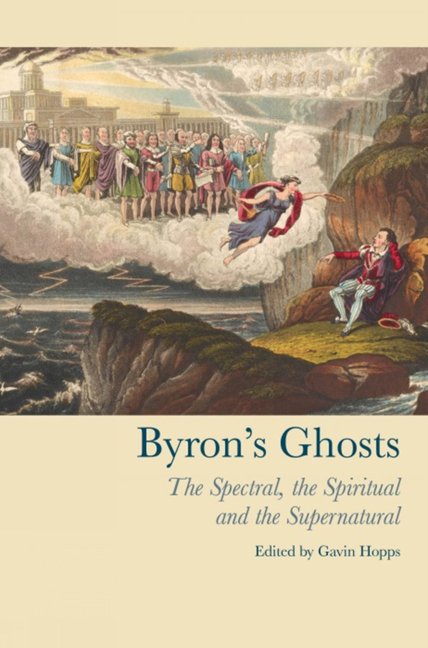Book contents
- Frontmatter
- Dedication
- Contents
- Acknowledgements
- Texts and Abbreviations
- Introduction: The Re-Enchantment of Romanticism
- Chapter 1 Determining Unknown Modes of Being: A Map of Byron's Ghosts and Spirits
- Chapter 2 Shades of Being: Byron and the Trespassing of Ontology
- Chapter 3 Byron and the Noonday Demons
- Chapter 4 Conjuration and Exorcism: Byron's Spectral Rhetoric
- Chapter 5 Byron avec Sade: Material and Spectral Violence in Childe Harold's Pilgrimage Canto IV
- Chapter 6 ‘’Twixt Life and Death’: Childe Harold's Pilgrimage, Don Juan and the Sublime
- Chapter 7 Byron, Ann Radcliffe and the Religious Implications of the Explained Supernatural in Don Juan
- Chapter 8 The Haunting of Don Juan
- Chapter 9 Being neither Here nor There: Byron and the Art of Flirtation
- Afterword: Blowing on a Dead Man's Embers: Byron's Biographical Ghosts
- Bibliography
- Notes on Contributors
- Index
Chapter 2 - Shades of Being: Byron and the Trespassing of Ontology
- Frontmatter
- Dedication
- Contents
- Acknowledgements
- Texts and Abbreviations
- Introduction: The Re-Enchantment of Romanticism
- Chapter 1 Determining Unknown Modes of Being: A Map of Byron's Ghosts and Spirits
- Chapter 2 Shades of Being: Byron and the Trespassing of Ontology
- Chapter 3 Byron and the Noonday Demons
- Chapter 4 Conjuration and Exorcism: Byron's Spectral Rhetoric
- Chapter 5 Byron avec Sade: Material and Spectral Violence in Childe Harold's Pilgrimage Canto IV
- Chapter 6 ‘’Twixt Life and Death’: Childe Harold's Pilgrimage, Don Juan and the Sublime
- Chapter 7 Byron, Ann Radcliffe and the Religious Implications of the Explained Supernatural in Don Juan
- Chapter 8 The Haunting of Don Juan
- Chapter 9 Being neither Here nor There: Byron and the Art of Flirtation
- Afterword: Blowing on a Dead Man's Embers: Byron's Biographical Ghosts
- Bibliography
- Notes on Contributors
- Index
Summary
Byron was fascinated by the in-between, and his gaze was often drawn to bits of reality that the fabric of language doesn't quite cover: ‘And then his former movements would redouble / With something between carelessness and trouble’ (The Island, III, 4, 115–16). This sense that there are bits of reality that incorrigibly slip between the cracks of language is signalled by those features of the poet's manner – such as his lack of polish, his indifference to grammar, the ‘forwardness’ or ‘galloping nature’ of his rhetoric – which create the impression of language in pursuit of something. it is also apparent in his notorious tolerance of self-contradiction: ‘But if a writer should be quite consistent, / How could he possibly show things existent?’ (DJ, XV, 87). There are, however, certain bits of reality in particular that give language the slip, since they stray outside or play between our either/or ontological categories. This kind of ‘ontological trespassing’ has been brought into focus by the work of Jacques Derrida, who has identified the in-between as a form of spectrality and proposed an alternative ‘hauntological’ grammar to describe its shadowy comings and goings. This alternative economy of the spectral is helpfully summarized by Mary-Jane Rubenstein:
In Specters of Marx, Derrida reminds us that classical ontology is constituted dialectically, drawing the boundaries of is-ness itself by drawing definitive distinctions between being and non-being, presence and absence, me and you, the living and the dead, here and there, now and then, etc. Looking to unsettle the monadic understanding of identity that emerges from the mutual exclusion of these pairs […] Derrida locates in the pseudo-logic of haunting a certain anteriority to, and perpetual exceeding of, the onto-logic of binary opposition. Something that haunts me unsettles all the self-identical products of ontology, because a ghost – whether it be mine or another's – neither is nor is not, is neither simply present nor simply absent, neither me nor someone entirely different from me, neither living nor properly dead, neither fully here nor fully there […].
- Type
- Chapter
- Information
- Byron's GhostsThe Spectral, the Spiritual and the Supernatural, pp. 48 - 82Publisher: Liverpool University PressPrint publication year: 2013



